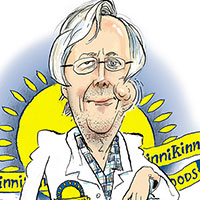In the late nineteenth century, French novelist Marcel Proust participated in an exercise which could be thought of as the Facebook of its era — he answered a questionnaire about himself in a friend’s Confession Album.
Proust’s answers have been published, in one form or another, for more than a century. Many have used the questionnaire for their own devices, the most notable being Vanity Fair’s Proust Questionnaire featuring celebrities. The Tomato now gives it a culinary twist.
Ted Wolff Von Selzam was a gluten-free pioneer who started selling gluten-free baked goods at the Old Strathcona Farmers’ Market in 1989. He named the company Kinnikinnick, loving the local bearberry legends, and thinking the name was unforgettable, if not easy to spell.
Lynne Bigam was celiac and a loyal customer. Like Victor Kiam, who loved the product so much he bought the company (remember those Remington shaver ads?) the Bigams bought into Kinnikinnick in 1997, and became sole owners when Ted retired in 2005. Lynne left her law practice to work for the family business as does son Jay; Kinnikinnick’s early adoption of on-line sales was spearheaded by Jay.
Over the past 15 years the family has continued to build Kinnikinnick into a major global supplier of high- quality gluten-free foods.

Red Deer.
Where would you like to live?
Somewhere between London, Paris and Maui, and right here too.
What would you be doing if not Kinnikinnick?
Running a business, wherever there was a good opportunity, probably in some other kind of manufacturing in food or forestry.
What do you most appreciate in your friends?
The ability to exchange ideas, understanding, loyalty, forbearance.
Your favourite qualities in a dish?
Variety. When traveling, I always want to know what the special dish is for the area.
A wine?
I like dry and heavy. Right now, enjoying Malbec.
Who would be at your dream dinner table (dead or alive)?
David Foster, Oscar Peterson, Tom Clancy, Andrea Bocelli.
Who would cook?
Michael Smith and Anna Olsen.
Which words or phrases do you most overuse?
I think we should do it this way.
Current culinary obsession/exploration?
We look for best-selling conventional foods and think, how can we convert that into a unique gluten-free product? Right now we are developing the best way to combine meat in a gluten-free item, such as a chicken pot pie.
We are always looking to improve the nutrition of our products—our cookies are made with pulses, which lessens the carbo load. Our products are allergy friendly, we don’t use trans fats, artificial flavours or colours, preservatives, dairy, nuts and rarely do we use soy. We lab test extensively.
Best (food processing) thing that ever happened to you?
We bought Parmalat’s large food manufacturing facility (Sunland Foods, a private label cookie plant) and converted it to gluten-free in 2005. This allowed
us to expand our business. It had some of the most sophisticated bakery equipment in the world, and was one of the three largest plants at the time. It is 120,000 square feet, and we spent close to seven months decontaminating it. There are four 150-foot ovens now making bread and pizza dough.
Mentors?
My wife is my best mentor and critic. I had a business partner for 30 years; we built Canadian Malting into a very successful export company. The Edmonton CEO club is a group of major family-owned food processors in the Edmonton area. We get together to solve common problems like freight costs.
Philosophy?
To never have to say, ‘if only I’d.’
What’s next?
We are extending our markets beyond the Americas, especially to the Far East and Europe. The Canadian standard for gf is the lowest, 20ppm, which makes Kinnikinnick foods attractive in other markets. Our customer base includes people with all sorts of allergies and food intolerances, not just gf. People always say this can’t be gluten-free when they taste our products.
We make a difference; our customers can live normal lives. I get handwritten notes that say, ‘for the first time I can have pancakes and smores.’ That’s very gratifying.